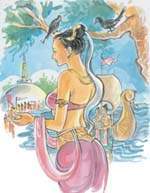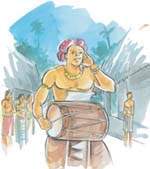|
This
article is part of a continuing series on the ‘Mahavamsa’,
the recorded chronicle of Sri Lankan history
Vihara Maha Devi
 1
The ship carrying Princess Devi sailed far into the ocean. The sea
water, which had flowed into the city of Kelaniya, immediately receded.
The people were at ease. The palace, on the other hand, was in deep
mourning. The queen mother was wailing. The maids, who had stood
in attendance and served Princess Devi for a long period, were weeping.
The king, Kelani-Tissa was engrossed in deep thought. He was almost
fasting. The citizens, who gathered in different places, were worried
about the plight of the princess. They were so sad, that they almost
blamed the king, for taking such a decision. 1
The ship carrying Princess Devi sailed far into the ocean. The sea
water, which had flowed into the city of Kelaniya, immediately receded.
The people were at ease. The palace, on the other hand, was in deep
mourning. The queen mother was wailing. The maids, who had stood
in attendance and served Princess Devi for a long period, were weeping.
The king, Kelani-Tissa was engrossed in deep thought. He was almost
fasting. The citizens, who gathered in different places, were worried
about the plight of the princess. They were so sad, that they almost
blamed the king, for taking such a decision.
2
Meanwhile, ‘Ruhuna’ – the Southern Province –
was gaining prosperity. Reputed seats of learning had sprung up.
The population had increased. The people of Anuradhapura, who did
not tolerate Chola rule, migrated to the south. They set up little
settlements in the southern province. The majority of the migrants
were the Buddhist monks. They were well respected by the people.
The king built temples and saw to the comfort of these monks. King
Elara could not use his influence beyond the river Mahaweli. As
such, his power was confined to Anuradhapura.
 3
The ship carrying Princess Devi, sailed safely and landed in the
southern coast, on the shore near Lanka Vihara, to be exact. ( It
is believed that she landed at Kirinda). According to ‘Thupavamsa’,
some birds who spotted the ship, were the first to go and inform
the king. King Kavan-Tissa was able to read bird language. Understanding
what the birds said, he immediately sent his ministers to the place
mentioned. Princess Devi was conducted to the city of Magama –
in procession. The princess related what really happened to her.
King Kavan-Tissa, who was quite taken up by the princess, made her
his queen. 3
The ship carrying Princess Devi, sailed safely and landed in the
southern coast, on the shore near Lanka Vihara, to be exact. ( It
is believed that she landed at Kirinda). According to ‘Thupavamsa’,
some birds who spotted the ship, were the first to go and inform
the king. King Kavan-Tissa was able to read bird language. Understanding
what the birds said, he immediately sent his ministers to the place
mentioned. Princess Devi was conducted to the city of Magama –
in procession. The princess related what really happened to her.
King Kavan-Tissa, who was quite taken up by the princess, made her
his queen.
4
This couple lived very happily. As the princess was spotted near
a vihara (a temple) she was re-named Vihara Maha Devi. They were
childless for a long period and this worried both the king and the
queen. The king, who respected the Buddhist monks was in the habit
of providing them with all their requirements and the queen too,
participated in all these religious activities. A number of temples
built by King Kavan-Tissa himself, received royal patronage. Among
them were the temple at ‘Situlpauwa’, Tissamaharama
and Kotagala.
5
At this time, there lived a virtuous novice monk in the Kotagala
temple. This priest was suffering from a sickness, which aggravated
off and on. Queen Viharamaha Devi, supplied all the medicines needed
by the priest and cared for him, like a mother. The priest too felt
a motherly love towards her. He did not survive long. He passed
away. The Mahavamsa and Thupavamsa state that this novice monk was
then conceived in the womb of Viharamaha Devi.
 6
Not long after the passing away of the monk, the queen showed signs
of pregnancy. There came on her the longings of a pregnant woman.
She craved for three very unusual things. One was to have a honey-comb
about 50 yards in length, as her pillow, offer honey from it, to
thousand priests and for her to eat the honey that remained. The
second wish, was more difficult to satisfy. She longed to drink
the water that was used to cleanse the sword with which the head
of Veludeva, the chief of Elara’s twenty warriors, had been
struck off, while standing on that head. 6
Not long after the passing away of the monk, the queen showed signs
of pregnancy. There came on her the longings of a pregnant woman.
She craved for three very unusual things. One was to have a honey-comb
about 50 yards in length, as her pillow, offer honey from it, to
thousand priests and for her to eat the honey that remained. The
second wish, was more difficult to satisfy. She longed to drink
the water that was used to cleanse the sword with which the head
of Veludeva, the chief of Elara’s twenty warriors, had been
struck off, while standing on that head.
 7
The third wish was to wear a head-dress made of a garland of unfaded
lotus blossoms from the Tissa-Weva. Hearing all this, the king consulted
his sooth-sayers. When they were informed of the queen’s wishes,
they made the following forecast. “Oh King, the queen had
conceived a very powerful and virtuous son. This prince, when he
grows up, will defeat the Cholas and unify the whole of Lanka, under
one banner”. The king, no doubt, was highly pleased. 7
The third wish was to wear a head-dress made of a garland of unfaded
lotus blossoms from the Tissa-Weva. Hearing all this, the king consulted
his sooth-sayers. When they were informed of the queen’s wishes,
they made the following forecast. “Oh King, the queen had
conceived a very powerful and virtuous son. This prince, when he
grows up, will defeat the Cholas and unify the whole of Lanka, under
one banner”. The king, no doubt, was highly pleased.
8
The king then sent his tom-tom beaters in all directions, with the
following announcement. “If anyone was to spot a honey-comb,
50 yards in length, he should keep the palace informed. He will
be rewarded with valuable gifts’. This announcement was made
known far and wide. |
 1
The ship carrying Princess Devi sailed far into the ocean. The sea
water, which had flowed into the city of Kelaniya, immediately receded.
The people were at ease. The palace, on the other hand, was in deep
mourning. The queen mother was wailing. The maids, who had stood
in attendance and served Princess Devi for a long period, were weeping.
The king, Kelani-Tissa was engrossed in deep thought. He was almost
fasting. The citizens, who gathered in different places, were worried
about the plight of the princess. They were so sad, that they almost
blamed the king, for taking such a decision.
1
The ship carrying Princess Devi sailed far into the ocean. The sea
water, which had flowed into the city of Kelaniya, immediately receded.
The people were at ease. The palace, on the other hand, was in deep
mourning. The queen mother was wailing. The maids, who had stood
in attendance and served Princess Devi for a long period, were weeping.
The king, Kelani-Tissa was engrossed in deep thought. He was almost
fasting. The citizens, who gathered in different places, were worried
about the plight of the princess. They were so sad, that they almost
blamed the king, for taking such a decision. 3
The ship carrying Princess Devi, sailed safely and landed in the
southern coast, on the shore near Lanka Vihara, to be exact. ( It
is believed that she landed at Kirinda). According to ‘Thupavamsa’,
some birds who spotted the ship, were the first to go and inform
the king. King Kavan-Tissa was able to read bird language. Understanding
what the birds said, he immediately sent his ministers to the place
mentioned. Princess Devi was conducted to the city of Magama –
in procession. The princess related what really happened to her.
King Kavan-Tissa, who was quite taken up by the princess, made her
his queen.
3
The ship carrying Princess Devi, sailed safely and landed in the
southern coast, on the shore near Lanka Vihara, to be exact. ( It
is believed that she landed at Kirinda). According to ‘Thupavamsa’,
some birds who spotted the ship, were the first to go and inform
the king. King Kavan-Tissa was able to read bird language. Understanding
what the birds said, he immediately sent his ministers to the place
mentioned. Princess Devi was conducted to the city of Magama –
in procession. The princess related what really happened to her.
King Kavan-Tissa, who was quite taken up by the princess, made her
his queen. 6
Not long after the passing away of the monk, the queen showed signs
of pregnancy. There came on her the longings of a pregnant woman.
She craved for three very unusual things. One was to have a honey-comb
about 50 yards in length, as her pillow, offer honey from it, to
thousand priests and for her to eat the honey that remained. The
second wish, was more difficult to satisfy. She longed to drink
the water that was used to cleanse the sword with which the head
of Veludeva, the chief of Elara’s twenty warriors, had been
struck off, while standing on that head.
6
Not long after the passing away of the monk, the queen showed signs
of pregnancy. There came on her the longings of a pregnant woman.
She craved for three very unusual things. One was to have a honey-comb
about 50 yards in length, as her pillow, offer honey from it, to
thousand priests and for her to eat the honey that remained. The
second wish, was more difficult to satisfy. She longed to drink
the water that was used to cleanse the sword with which the head
of Veludeva, the chief of Elara’s twenty warriors, had been
struck off, while standing on that head. 7
The third wish was to wear a head-dress made of a garland of unfaded
lotus blossoms from the Tissa-Weva. Hearing all this, the king consulted
his sooth-sayers. When they were informed of the queen’s wishes,
they made the following forecast. “Oh King, the queen had
conceived a very powerful and virtuous son. This prince, when he
grows up, will defeat the Cholas and unify the whole of Lanka, under
one banner”. The king, no doubt, was highly pleased.
7
The third wish was to wear a head-dress made of a garland of unfaded
lotus blossoms from the Tissa-Weva. Hearing all this, the king consulted
his sooth-sayers. When they were informed of the queen’s wishes,
they made the following forecast. “Oh King, the queen had
conceived a very powerful and virtuous son. This prince, when he
grows up, will defeat the Cholas and unify the whole of Lanka, under
one banner”. The king, no doubt, was highly pleased.